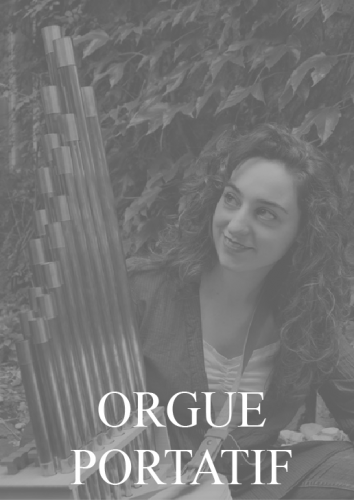Cristina Alis Raurich
Landini versus Machaut
Le cours peut se faire en Français, en Anglais, en Espagnol ou en Catalan
 Francesco Landini and Guillaume de Machaut are linked to the portative organ performance practice. At the same time they are very relevant figures of the 14th century who wrote magnificent masterworks of polyphony.
Francesco Landini and Guillaume de Machaut are linked to the portative organ performance practice. At the same time they are very relevant figures of the 14th century who wrote magnificent masterworks of polyphony.
In the course we will work on their polyphonic compositions and on questions on performance practice of the porative organ. Beginners will receive basic portative organ technique.
In this two-weekend course (possibility of one weekend only too) space will be given for :
- Ensemble lesson
- Individual lessons (4 lessons of 45 min each)
- Practice time with a portative organ
Open to beginners and advanced students.
There will be instruments for rent for the students who do not have an instrument.
Dates :
- 23-24 novembre & 30 novembre-1 décembre 2019
- Possibility to participate at only 1 weekend.
Place :
-
22 rue Lallemand, Montpellier (34000)
Registration : here
Contact : Gisèle Clément – 06 70 74 19 20 – contact@cimmedieval.org
Schedules :
-
Saturday and Sunday : 9:00-12:30h & 14:30-18:30
Tarifs :
Normal :
- 240 € (2 weekends, ensemble + 4 individual lessons) + 15 € of membership to the CIMM, or
- 190 € (1 weekend, ensemble + 2 individual lessons) + 15 € of membership to the CIMM, or
- 170 € (2 weekends, ensemble) + 15 € of membership to the CIMM, or
- 120 € (1 weekend, ensemble) + 15 € of membership to the CIMM.
Etudiants de Medieval Music Besalú et de Cristina Alís Raurich :
- 210 € (2 weekends, ensemble + 4 individual lessons) + 5 € of membership to the CIMM, or
- 160 € (1 weekend, ensemble + 2 individual lessons) + 5 € of membership to the CIMM, or
- 140 € (2 weekends, ensemble) + 5 € of membership to the CIMM, or
- 90 € (1 weekend, ensemble) + 5 € of membership to the CIMM
Faculty :
Initially Cristina Alís Raurich pursued a career as a pianist in her native Catalonia, where she obtained a Masters diploma from the Liceu Conservatory and Luthier School in Barcelona and was active both as pianist (solo, chamber and orchestral) and piano teacher. Later, while pursuing her professional piano career in The Hague, she became interested in medieval music, which led her to obtain a masters degree in medieval and Renaissance keyboards in Basel (clavicimbalum, clavicytherium, portative organ).
On stage she subsequently replaced the piano with a variety of medieval keyboards. As a performer she is a member of the ensembles Magister Petrus, La Douce Semblance and Sonus Hyspaniae, and plays in a duo with Maria de Mingo (citole). Both with these ensembles and other musicians she performs across Europe and appears on TV and radio. She also collaborates with numerous medieval, Renaissance and fusion ensembles.
After extensive musicological and organological research and in collaboration with the organ maker Walter Chinaglia, Cristina became the first person in the world to have reconstructed a 13th century model of a portative organ. This instrument – which possess a colourful and sharp sound – opens a new door into the understanding of the sound aesthetics of the 13th century.
Making the most of her multilingual skills, Cristina is passionately committed to pedagogy in the fields of medieval keyboards, medieval music and musicology. She is teacher and assistant director at the International Course on Medieval Music Performance in Besalú (Spain), faculty member at the Centre International de Musiques Médiévales de Montpellier (France) and assistant director of the International Course on Late Medieval & Renaissance Music in San Marino (Italy). She regularly gives talks and masterclasses across Europe and North America.
At the moment she is enrolled in a Doctoral Program at the University of Würzburg (Germany) and at the Schola Cantorum Basiliensis (Switzerland). Her research and publication topics include the reconstruction of medieval organs and their musical repertory, the study of the oldest keyboard intabulations and a newly discovered Aquitanian Gradual-Tropary-Sequentiary.
Recently she created a website to promote knowledge of medieval organs: www.medievalorgan.com